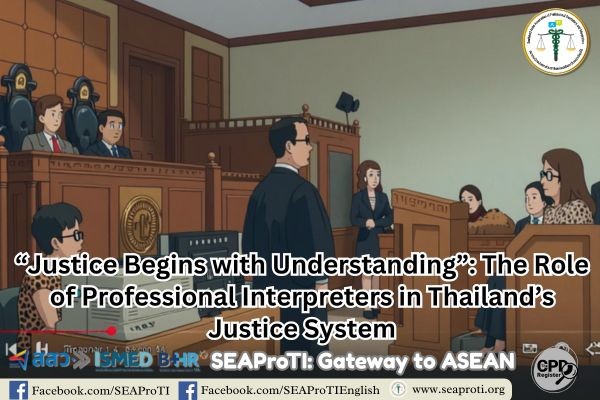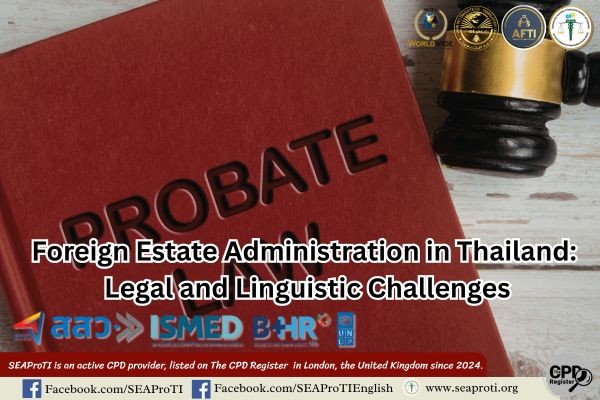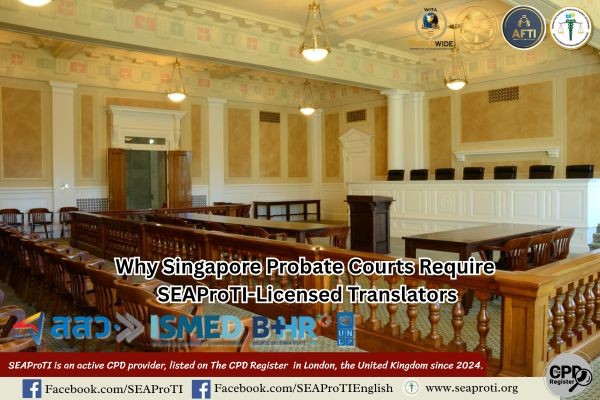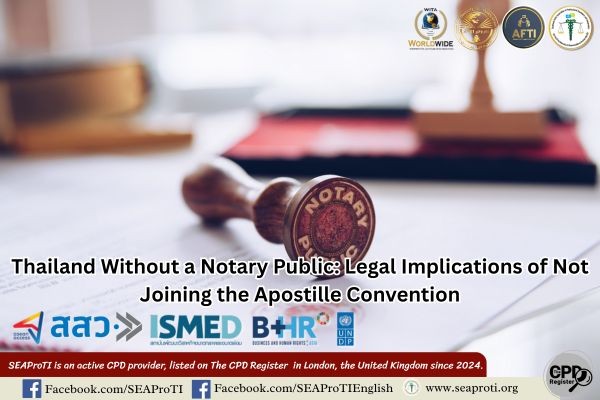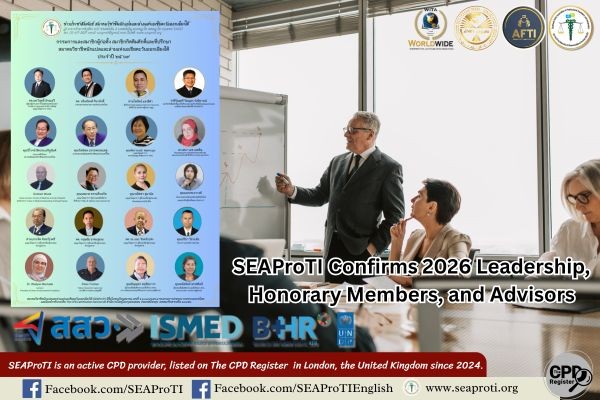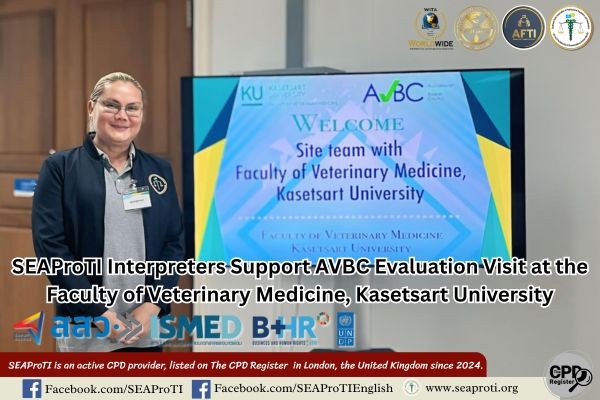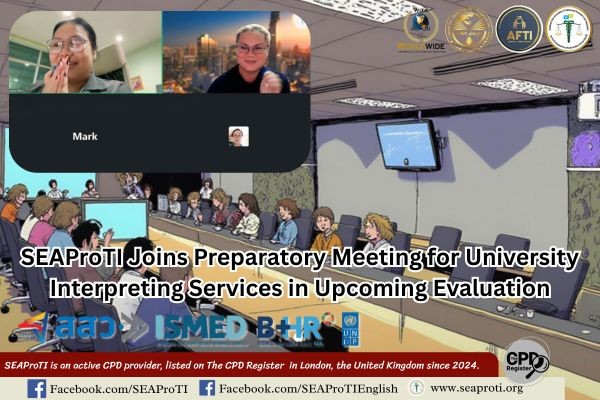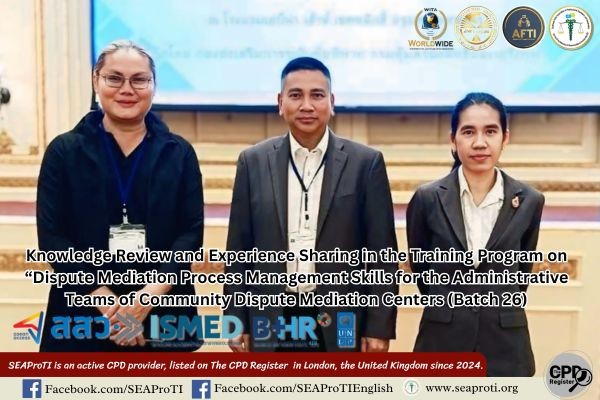“Justice Begins with Understanding”: The Role of Professional Interpreters in Thailand’s Justice System
19 October 2025, Bangkok – This article examines the legal status and indispensable role of professional interpreters in Thailand’s justice system within the framework of national law and international human rights principles. Drawing from the 2017 Constitution of the Kingdom of Thailand, the Criminal Procedure Code, and the Administrative Procedure Act B.E. 2539 (1996), as well as Article 14(3)(f) of the International Covenant on Civil and Political Rights (ICCPR), it argues that interpretation is not a courtesy but a legal right essential to due process. The paper highlights the necessity of certified interpreters who possess legal literacy, impartiality, and confidentiality—contrasting this with the risks posed by unqualified or machine translation that can distort meaning and jeopardize justice.
Introduction
Justice cannot be achieved without understanding. When defendants, witnesses, or litigants cannot comprehend the language used in legal proceedings, their ability to exercise rights and defend themselves is impaired. In Thailand, the use of interpreters is not merely a procedural convenience but a constitutional and human right that safeguards fair trial principles. Professional interpreters ensure that linguistic diversity does not become a barrier to justice, reflecting both Thailand’s constitutional commitments and its obligations under international human rights law (Office of the High Commissioner for Human Rights, 1966).
Legal Foundations of the Right to Interpretation in Thailand
The right to interpretation is embedded in multiple Thai legal instruments:
- The Constitution of the Kingdom of Thailand B.E. 2560 (2017), Section 29 paragraph 3, guarantees that “a defendant or accused person has the right to an interpreter if he or she does not understand the Thai language.”
- The Criminal Procedure Code, Sections 13 and 172, mandates that the court shall appoint an interpreter for defendants or witnesses who cannot communicate in Thai.
- The Administrative Procedure Act B.E. 2539 (1996), Section 13, recognizes the right of individuals to use interpreters when dealing with administrative authorities.
These provisions align with Article 14(3)(f) of the ICCPR, to which Thailand acceded in 1996, stipulating that an accused person in a criminal case has the right to free assistance of an interpreter if they cannot understand the language used in court (United Nations, 1966).
Professional Interpreters: Beyond Bilingual Ability
A professional interpreter in judicial settings must uphold standards far beyond simple bilingual proficiency. They must possess:
- Knowledge of legal terminology and evidentiary rules,
- Professional ethics, including confidentiality, impartiality, and fidelity to meaning, and
- Emotional control and communication skills in high-pressure environments.
The Southeast Asian Association of Professional Translators and Interpreters (SEAProTI) has established a Peer Certification System and a Code of Ethics to ensure that interpreters meet international professional standards comparable to those of AIIC and NAATI.
Risks of Unqualified or Machine-Based Interpretation
The use of unqualified interpreters or machine translation in legal contexts poses serious risks:
- Misinterpretation of “confession” as “acknowledgment of fact,” which alters legal implications.
- Distorted testimony that can render evidence inadmissible.
- Breach of confidentiality and data protection when AI systems are used without adequate safeguards.
Such failures may result in appeals, retrials, or annulled judgments, undermining public trust in the justice system (Department of Justice, 2020).
Interpreters as Guardians of Rights and Justice
Professional interpreters are not merely linguistic facilitators—they are guardians of justice and human rights. By ensuring accurate communication, they enable courts to uncover truth, protect procedural fairness, and maintain the integrity of the legal process. Certified interpreters thus serve as a bridge between linguistic diversity and judicial equality.
Conclusion
“Understanding” is the foundation of “justice.” The role of certified interpreters is essential to upholding fairness, transparency, and respect for human dignity within Thailand’s justice system. Strengthening professional standards, certification mechanisms, and ethical governance is vital to ensuring that justice in Thailand is never lost in translation.
References
- Department of Justice. (2020). Ensuring language access in the justice system: Professional interpreter standards and legal rights. UK Government Publishing.
- Office of the High Commissioner for Human Rights. (1966). International Covenant on Civil and Political Rights. United Nations.
- Royal Gazette. (2017). Constitution of the Kingdom of Thailand B.E. 2560 (2017). Bangkok: Secretariat of the Cabinet.
- Criminal Procedure Code of Thailand. (12th ed.). Bangkok: Nititham Publishing.
- Administrative Procedure Act B.E. 2539 (1996). Bangkok: Office of the Council of State.
- United Nations. (1966). International Covenant on Civil and Political Rights, Article 14(3)(f). Geneva: OHCHR.
- Southeast Asian Association of Professional Translators and Interpreters (SEAProTI). (2024). Professional Interpreter Qualification Standards and Code of Ethics (Peer Certification System). Bangkok: SEAProTI.
About Certified Translators, Translation Certifiers, and Certified Interpreters of SEAProTI
The Southeast Asian Association of Professional Translators and Interpreters (SEAProTI) has formally announced the qualifications and requirements for registration of Certified Translators, Translation Certification Providers, and Certified Interpreters in Sections 9 and 10 of the Royal Gazette, published by the Secretariat of the Cabinet, Office of the Prime Minister of Thailand, on 25 July 2024 (Vol. 141, Part 66 Ng, p. 100). Certified Translators, Translation Certification Providers, and Certified Interpreters
The Council of State has proposed the enactment of a Royal Decree, granting registered translators and recognized translation certifiers from professional associations or accredited language institutions the authority to provide legally valid translation certification (Letter to SEAProTI dated April 28, 2025)
SEAProTI is the first professional association in Thailand and Southeast Asia to implement a comprehensive certification system for translators, certifiers, and interpreters.
Head Office: Baan Ratchakru Building, No. 33, Room 402, Soi Phahonyothin 5, Phahonyothin Road, Phaya Thai District, Bangkok 10400, Thailand
Email: hello@seaproti.com | Tel.: (+66) 2-114-3128 (Office hours: Mon–Fri, 09:00–17:00)
“ความยุติธรรมเริ่มต้นที่การเข้าใจ”: บทบาทของล่ามมืออาชีพในกระบวนการยุติธรรมไทย
บทความนี้มุ่งวิเคราะห์สถานะทางกฎหมายและความสำคัญของล่ามมืออาชีพในกระบวนการยุติธรรมไทย โดยเชื่อมโยงกับหลักสิทธิมนุษยชนระหว่างประเทศตามกติการะหว่างประเทศว่าด้วยสิทธิพลเมืองและสิทธิทางการเมือง (ICCPR) มาตรา 14 (3)(f) ซึ่งรับรองสิทธิในการได้รับการแปลที่ถูกต้องและเป็นธรรมเมื่อผู้ถูกกล่าวหาไม่เข้าใจภาษาของศาล บทความนำเสนอข้อเท็จจริงทางกฎหมายไทย เช่น รัฐธรรมนูญแห่งราชอาณาจักรไทย พ.ศ. 2560 ประมวลกฎหมายวิธีพิจารณาความอาญา และพระราชบัญญัติวิธีปฏิบัติราชการทางปกครอง พ.ศ. 2539 พร้อมทั้งชี้ให้เห็นความเสี่ยงที่เกิดจากการใช้ล่ามไม่มีใบอนุญาตหรือเทคโนโลยีแปลภาษาอัตโนมัติ ซึ่งอาจนำไปสู่การบิดเบือนความหมายทางกฎหมายและการละเมิดสิทธิขั้นพื้นฐาน
บทนำ
ความยุติธรรมในระบบศาลไม่อาจเกิดขึ้นได้ หากคู่ความไม่สามารถเข้าใจภาษาในการดำเนินกระบวนพิจารณา การมี “ล่าม” จึงมิใช่เพียงความสะดวก แต่เป็นสิทธิขั้นพื้นฐานที่ได้รับการรับรองโดยกฎหมายไทยและกฎหมายระหว่างประเทศ (Office of the High Commissioner for Human Rights, 1966) ในสังคมที่มีความหลากหลายทางภาษาและเชื้อชาติ เช่น ประเทศไทย การจัดให้มีล่ามมืออาชีพจึงเป็นองค์ประกอบสำคัญของกระบวนการยุติธรรมที่เที่ยงธรรมและโปร่งใส
สิทธิของผู้ที่ไม่เข้าใจภาษาไทยได้รับการรับรองโดยกฎหมายหลายฉบับ ได้แก่
- รัฐธรรมนูญแห่งราชอาณาจักรไทย พ.ศ. 2560 มาตรา 29 วรรคสาม ระบุชัดว่า “ผู้ต้องหาหรือจำเลยมีสิทธิได้รับการแปลหากไม่เข้าใจภาษาไทย”
- ประมวลกฎหมายวิธีพิจารณาความอาญา มาตรา 13 และ 172 บัญญัติให้ศาลจัดหาล่ามให้กับจำเลยหรือพยานที่ไม่สามารถสื่อสารเป็นภาษาไทยได้
- พระราชบัญญัติวิธีปฏิบัติราชการทางปกครอง พ.ศ. 2539 มาตรา 13 รับรองสิทธิของผู้มีส่วนได้เสียที่จะใช้ล่ามในการติดต่อหน่วยงานของรัฐ
หลักการดังกล่าวสอดคล้องกับ มาตรา 14 (3)(f) ของ ICCPR ซึ่งประเทศไทยให้สัตยาบันตั้งแต่ปี พ.ศ. 2539 (United Nations, 1966) โดยกำหนดให้บุคคลที่ถูกกล่าวหาในคดีอาญามีสิทธิได้รับการช่วยเหลือจากล่ามหากไม่เข้าใจภาษาที่ใช้ในการพิจารณา
คุณสมบัติของล่ามมืออาชีพในกระบวนการยุติธรรม
การเป็น “ล่ามมืออาชีพ” หมายถึงการมีความรู้และจรรยาบรรณเฉพาะด้าน ซึ่งแตกต่างจากผู้ที่เพียงแค่พูดได้สองภาษา ล่ามในศาลต้องมีความเข้าใจใน
ศัพท์กฎหมายและกฎหมายพยานหลักฐาน
- จรรยาบรรณวิชาชีพ เช่น การรักษาความลับ (confidentiality) และความเป็นกลาง (impartiality)
- การควบคุมอารมณ์และน้ำเสียง เพื่อสะท้อนเจตนาของผู้พูดโดยไม่แทรกความคิดเห็นส่วนตัว
สมาคมวิชาชีพนักแปลและล่ามแห่งเอเชียตะวันออกเฉียงใต้ (SEAProTI) ได้พัฒนามาตรฐานคุณวุฒิและระบบรับรอง (Peer Certification System) เพื่อส่งเสริมความเชื่อมั่นในคุณภาพของล่ามในกระบวนการยุติธรรมไทย
ความเสี่ยงจากการใช้ล่ามไม่มีใบอนุญาตหรือเทคโนโลยีแปลภาษา
การใช้ล่ามที่ไม่ได้ผ่านการรับรองหรือการใช้ระบบแปลภาษาอัตโนมัติในกระบวนการยุติธรรมอาจสร้างความเสียหายร้ายแรง ตัวอย่างเช่น
- การแปลคำว่า “รับสารภาพ” เป็น “ยอมรับข้อเท็จจริง” ซึ่งมีผลต่อสถานะของคำสารภาพในทางกฎหมาย
- การตีความผิดในคำให้การของพยาน ซึ่งอาจทำให้หลักฐานเสียหาย
- การละเมิดข้อมูลส่วนบุคคลเมื่อใช้เทคโนโลยี AI โดยไม่ผ่านการตรวจสอบด้านความปลอดภัยข้อมูล
กรณีเช่นนี้อาจนำไปสู่การอุทธรณ์ การเพิกถอนคำพิพากษา หรือแม้แต่การถูกวิพากษ์วิจารณ์ต่อความน่าเชื่อถือของศาลและหน่วยงานยุติธรรม (Department of Justice, 2020)
บทบาทของล่ามในฐานะผู้พิทักษ์สิทธิและความยุติธรรม
ล่ามมืออาชีพไม่ใช่เพียงผู้ถ่ายทอดภาษา แต่คือ “ผู้พิทักษ์สิทธิของผู้ต้องหาและผู้เสียหาย” รวมทั้งเป็นกลไกสำคัญในการรักษามาตรฐานของกระบวนการยุติธรรมที่โปร่งใสและตรวจสอบได้ การมีล่ามที่มีคุณวุฒิและผ่านการรับรองจึงเป็นสิ่งจำเป็นในการสร้างความเชื่อมั่นของประชาชนต่อระบบยุติธรรมไทย
สรุป
“ความเข้าใจ” คือรากฐานของ “ความยุติธรรม” ล่ามจึงมิใช่เพียงผู้ช่วยในการสื่อสาร แต่เป็นส่วนหนึ่งของกลไกที่ค้ำจุนสิทธิมนุษยชนในสังคมประชาธิปไตย การยกระดับมาตรฐานวิชาชีพล่าม การรับรองคุณวุฒิ และการกำกับจรรยาบรรณอย่างเป็นระบบ คือกุญแจสำคัญในการทำให้ “ความยุติธรรม” ในประเทศไทยไม่หลงทางในความต่างของภาษา
เอกสารอ้างอิง (References)
- Department of Justice. (2020). Ensuring language access in the justice system: Professional interpreter standards and legal rights. UK Government Publishing.
- Office of the High Commissioner for Human Rights. (1966). International Covenant on Civil and Political Rights. United Nations.
- ราชกิจจานุเบกษา. (2560). รัฐธรรมนูญแห่งราชอาณาจักรไทย พุทธศักราช 2560. กรุงเทพฯ: สำนักเลขาธิการคณะรัฐมนตรี.
- ประมวลกฎหมายวิธีพิจารณาความอาญา. (พิมพ์ครั้งที่ 12). กรุงเทพฯ: สำนักพิมพ์นิติธรรม.
- พระราชบัญญัติวิธีปฏิบัติราชการทางปกครอง พ.ศ. 2539. กรุงเทพฯ: สำนักพิมพ์สำนักงานคณะกรรมการกฤษฎีกา.
- United Nations. (1966). International Covenant on Civil and Political Rights, Article 14(3)(f). Geneva: OHCHR.
เกี่ยวกับนักแปลรับรอง ผู้รับรองการแปล และล่ามรับรองของสมาคมวิชาชีพนักแปลและล่ามแห่งเอเชียตะวันออกเฉียงใต้
สมาคมวิชาชีพนักแปลและล่ามแห่งเอเชียตะวันออกเฉียงใต้ (SEAProTI) ได้ประกาศหลักเกณฑ์และคุณสมบัติผู้ที่ขึ้นทะเบียนเป็น “นักแปลรับรอง (Certified Translators) และผู้รับรองการแปล (Translation Certification Providers) และล่ามรับรอง (Certified Interpreters)” ของสมาคม หมวดที่ 9 และหมวดที่ 10 ในราชกิจจานุเบกษา ของสำนักเลขาธิการคณะรัฐมนตรี ในสำนักนายกรัฐมนตรี แห่งราชอาณาจักรไทย ลงวันที่ 25 ก.ค. 2567 เล่มที่ 141 ตอนที่ 66 ง หน้า 100 อ่านฉบับเต็มได้ที่: นักแปลรับรอง ผู้รับรองการแปล และล่ามรับรอง
สำนักคณะกรรมการกฤษฎีกาเสนอให้ตราเป็นพระราชกฤษฎีกา โดยกำหนดให้นักแปลที่ขึ้นทะเบียน รวมถึงผู้รับรองการแปลจากสมาคมวิชาชีพหรือสถาบันสอนภาษาที่มีการอบรมและขึ้นทะเบียน สามารถรับรองคำแปลได้ (จดหมายถึงสมาคม SEAProTI ลงวันที่ 28 เม.ย. 2568)
สมาคมวิชาชีพนักแปลและล่ามแห่งเอเชียตะวันออกเฉียงใต้ เป็นสมาคมวิชาชีพแห่งแรกในประเทศไทยและภูมิภาคเอเชียตะวันออกเฉียงใต้ที่มีระบบรับรองนักแปลรับรอง ผู้รับรองการแปล และล่ามรับรอง
สำนักงานใหญ่: อาคารบ้านราชครู เลขที่ 33 ห้อง 402 ซอยพหลโยธิน 5 ถนนพหลโยธิน แขวงพญาไท เขตพญาไท กรุงเทพมหานคร 10400 ประเทศไทย
อีเมล: hello@seaproti.com โทรศัพท์: (+66) 2-114-3128 (เวลาทำการ: วันจันทร์–วันศุกร์ เวลา 09.00–17.00 น.)


